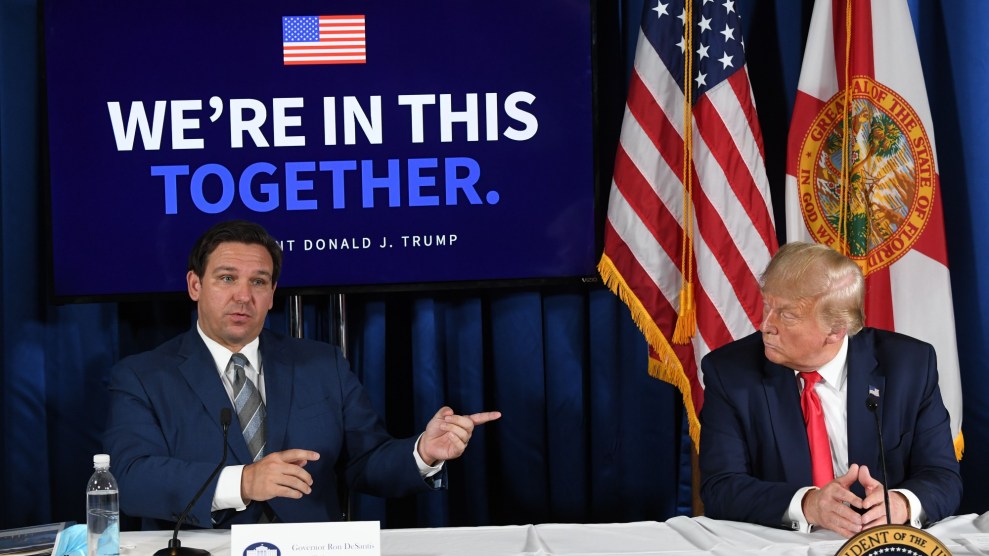
Naturalization ceremony in the Rotunda of the State Capitol in St. Paul, Minn.John Autey/MediaNews Group/St. Paul Pioneer Press/Getty
In early July, CNN’s Abby Phillip confronted Republican presidential candidate and biotech entrepreneur Vivek Ramaswamy about his position on birthright citizenship, the constitutional principle derived from the 14th Amendment that makes it possible for children born in the United States to automatically become citizens. When asked if he would end that long-standing tradition, Ramaswamy said “it would be necessary” because of the high levels of migration to the Southern border. “If migrants are coming illegally, intentionally to be able to establish an illegal toehold in the United States,” he said, “then I think that’s something we should not abide in this country.”
Aside from not appearing to understand that seeking asylum is not illegal, Ramaswamy also didn’t acknowledge the obvious irony of his position. As Phillip noted, he is the son of Indian immigrants. “You are saying that, even though birthright citizenship for you was something that was in play,” she said, “you would take it off the table now.” Ramaswamy argued that there should be a distinction—not supported by established legal precedent—between lawful and unlawful immigrants. He even went so far as to assert that US-born citizens must earn the “privileges of citizenship.” In his view, American high schoolers should pass the same civics test immigrants are required to take in order to become citizens.
Every high school student should be required to pass the *same* 128-question civics test required of legal immigrants to become citizens. The fact that this is controversial in America is a damning indictment of our Republic’s health. See test questions below & try it yourself. pic.twitter.com/Hgqdv7FsYT
— Vivek Ramaswamy (@VivekGRamaswamy) June 23, 2023
Ramaswamy is not the only 2024 GOP presidential hopeful latching onto birthright citizenship—which has been the law of the land for 155 years—as a dog whistle to rally the base. Last month, Florida Gov. Ron DeSantis, who has taken the anti-immigrant agenda to the next level with draconian legislation and political stunts in an attempt to present himself as being even more extreme than frontrunner Donald Trump, vowed to end the constitutional guarantee to citizenship for the US-born children of undocumented immigrants. “This idea that you can come across the border, two days later have a child, and somehow that’s an American citizen,” DeSantis told supporters and reporters at an event in Texas in June, “that was not the original understanding of the 14th Amendment, and so we’ll take action to force a clarification of that.”
The citizenship clause of the 14th Amendment, says Amanda Frost, author of You Are Not American: Citizenship Stripping from Dred Scott to the Dreamers, is fundamental to “who we are as a nation.” It played an important part in fostering equality in a nation of immigrants and of formerly enslaved people. Doing away with it would create irreparable damage and undermine democracy. “The birthright citizenship clause is not just about some technical legal rule of how you become a citizen,” Frost says. “It’s about how there’s no caste in America. You’re separate and apart from your parentage and your race and your lineage. You’re born here within our borders, you’re equal to everyone else born here—with the same rights and the same political power.”
Birthright citizenship has a long history and can be traced back to the jus soli, or “right of soil,” doctrine in English common law, which links citizenship to the place of birth. In the United States, formerly enslaved people led a campaign for citizenship on behalf of all Black people. As Martha S. Jones, author of Birthright Citizens: A History of Race and Rights in Antebellum America, writes in the Atlantic, they “saw themselves as belonging by virtue of birthright long before most others did.” After the Civil War, Congress overrode the veto of then-President Andrew Johnson to pass the Civil Rights Act of 1866, which declared people “of every race and color, without regard to any previous condition of slavery or involuntary servitude” who are born in the United States to be citizens.
During a congressional debate about that piece of legislation, Sen. Lyman Trumbull, a Republican from Illinois who introduced the bill, was asked by a leading opponent, Sen. Edgar Cowan of Pennsylvania, whether the measure would naturalize “the children of Chinese and Gypsies born in this country.” Trumbull replied, “Undoubtedly. Is not the child born in this country of German parents a citizen?” When the other legislator retorted that “Germans are not Chinese,” Sen. Trumbull said, “The law makes no such distinction, and the child of an Asiatic is just as much a citizen as the child of a European.”
After it was passed, the Civil Rights Act of 1866 served as a model for the 14th Amendment, which was ratified in 1868 and repealed the notorious Supreme Court ruling in Dred Scott v. Sandford that had denied citizenship to Black people. Its first sentence, the citizenship clause, states that “all persons born or naturalized in the United States, and subject to the jurisdiction thereof, are citizens of the United States and of the state wherein they reside.” In effect, the 14th Amendment enshrined birthright citizenship in the Constitution. “Adopted as part of the effort to purge the United States of the legacy of slavery,” historian Eric Foner wrote in the New York Times in 2018, “the principle of birthright citizenship remains an eloquent statement about the nature of American society, a powerful force for assimilation of the children of immigrants, and a repudiation of our long history of racism.”
It was also—in retrospect—a significant achievement of the Republican Party. “The Civil War and the emancipation of the slaves shaped the Republican Party and pushed it in the direction of nationalism, inclusiveness, and openness,” Foner told the Post in 2015. “The idea was that citizenship should be extended to people regardless of accidental characteristics, such as race, national origin, or the status of their parents. This established a national standard for citizenship. The principle was one of opportunity and inclusiveness. That’s what the Republican Party stood for. The 14th Amendment became one of the defining principles of the Republican Party.”
Over a century later, Republicans have distorted that “defining” principle. In 2015, Donald Trump’s immigration plan included a line about birthright citizenship, calling it “the biggest magnet for illegal immigration.” Then in 2018, he suggested he could end birthright citizenship through executive order, instead of a constitutional amendment. “We’re the only country in the world where a person comes in, has a baby and the baby is essentially a citizen of the United States for 85 years with all of those benefits,” Trump told Axios then. “It’s ridiculous. And it has to end.” (Trump’s statement was not true; several countries recognize birthright citizenship besides the United States.) In a forceful rebuke of a 2018 op-ed penned by Michael Anton—a former Trump administration national security official and Hillsdale College lecturer—arguing for the elimination of birthright citizenship, writer Robert Tracinski suggested in the conservative publication the Federalist, that Anton was essentially advocating for the GOP to become “the party of Dred Scott” and “against non-white people.”
Trump didn’t go through with the executive order then, but he has since renewed that pledge, saying in a recent campaign video that birthright citizenship is “based on a historical myth and a willful misinterpretation of the law.” Opponents who focus on the children of undocumented immigrants misleadingly claim that just being born in US territory shouldn’t automatically confer citizenship, and that “subject to the jurisdiction” ought to exclude the children of parents who are not legal permanent residents or citizens of the United States. John Eastman, the attorney who played a key role in Trump’s efforts to overturn the 2020 presidential election and now faces possible disbarment in California, wrote in a New York Times op-ed, “The 14th Amendment does not grant US citizenship to the children of anyone just because they can manage to give birth on US soil.”
That’s not what the framers of the 14th Amendment intended. They explicitly carved out exemptions to the birthright citizenship rule for only two groups: children of foreign diplomats and Native Americans under tribal rule; the latter were granted citizenship by Congress in 1924. Claims against birthright citizenship also ignore decades of established precedent. In 1898, the Supreme Court recognized in United States v. Wong Kim Ark that the San Francisco-born son of two Chinese parents who were not US citizens—they had been deemed ineligible for naturalization under racial laws—was indeed a citizen, regardless of his parents’ immigration status.
The 14th Amendment, Justice Horace Gray wrote for the 6-2 majority, “in clear words and in manifest intent, includes the children born, within the territory of the United States, of all other persons, of whatever race or color, domiciled within the United States.” He continued: “To hold that the 14th Amendment of the Constitution excludes from citizenship the children born in the United States of citizens or subjects of other countries, would be to deny citizenship to thousands of persons of English, Scotch, Irish, German, or other European parentage, who have always been considered and treated as citizens of the United States.”
In 1982, the landmark Plyer v. Doe decision secured the right to public education for undocumented children. Although the High Court was split 5-4 in the decision, all the justices agreed that “no plausible distinction with respect to the 14th Amendment ‘jurisdiction’ can be drawn between resident aliens whose entry into the United States was lawful and resident aliens whose entry was unlawful.” Birthright, James C. Ho, a Trump-appointed judge for the conservative Fifth Circuit of Appeals, once wrote, “is protected no less for children of undocumented persons than for descendants of Mayflower passengers.”
That clearly hasn’t stopped Republicans from championing legislation every year in an attempt to undermine the practice. Just this week, Rep. Matt Gaetz of Florida introduced the “End Birthright Citizenship Fraud Act of 2023” bill to deny automatic citizenship to children born to parents who aren’t citizens, refugees, legal residents, or active in the US Armed Forces. Nor has it prevented GOP presidential candidates from continuing to try to turn far-fetched, unsupported readings of the Constitution into a mainstream policy platform. The self-described “proud daughter of Indian immigrants,” Nikki Haley joined the chorus earlier this month, when she said she opposed birthright citizenship for “the 5 million people who’ve entered our country illegally.”
Even the great-great-grandmother of immigration hardliner DeSantis barely made it into the United States “legally,” according to the genealogist Megan Smolenyak. Luigia Colucci fled Italy in 1917 and traveled to the United States to reunite with her husband. She arrived in Ellis Island as the US Congress passed legislation imposing restrictions on so-called “undesirable” southern and eastern European immigrants, including people who were illiterate. Colucci couldn’t read or write, but she was lucky enough to be allowed into the country before the law went into effect. “Many people I research are beneficiaries of an immigration system that was kind of flexible and forgave little mistakes,” Smolenyak told the Tampa Bay Times. “If anything you would think they would be a little more compassionate.”













